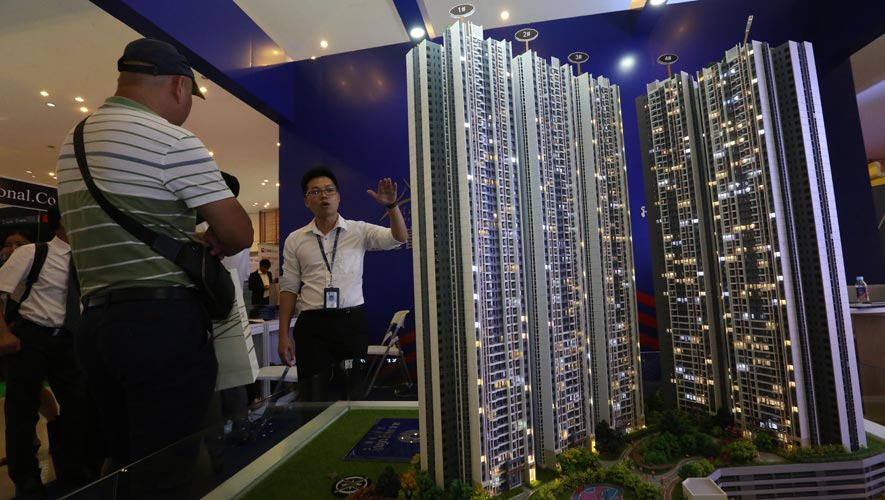The fallout from China’s new rules on outbound investments could reach the Kingdom
For the latest Cambodian Business news, visit Khmer Times Business
Cambodia’s real estate sector, which is dominated by Chinese investments, could be affected by the 2017 decision of China with continued tightening over controls on capital flowing out of the country to overseas projects.
And a few months ago, the Chinese government issued new regulations increasing the penalties for trying to illegally move capital out of China. An article in the Australian Financial Review states that offences of illegal foreign currency transactions of more than $1.04 million, or transactions that generate profits in excess of $20,758 are punishable to up to five years imprisonment or fines equivalent to five times the profit generated. A jail term of more than five years is meted for violations involving more than $5.19 million or transactions with profits amounting to more than $103,767. In the past, less severe penalties were handed down for similar violations.
The Chinese government has tightened capital controls as a matter of national security. The capital outflow restrictions are designed to stabilise a volatile and depreciating currency, buttress foreign exchange reserves, and address a declining current account surplus and slowing economy.
China is the leading investor in Cambodia’s property sector. A report in the East Asia Forum pointed out that China accounted for one third of real estate investments in Cambodia last year.
Most of the major real estate projects in the Kingdom, particularly in the major cities of Phnom Penh and Sihanoukville, were built by Chinese developers or funded by money from the East Asian country.
There are fears, founded and unfounded, that China’s move could negatively affect the sector in several ways.
Not a bad thing in the long run
Jayant Menon, lead economist at the Asian Development Bank (ADB), says via email that such actions are not new.
“China has had capital controls in place for quite a while now, and dating back to at least 2017, and has tightened them from time to time. Despite that, there have been huge outflows of capital, such as those into the real estate sector in Cambodia, and presumably a lot of these flows have been able to circumvent the tightening controls,” he points out.
He says that although this may impact demand for real estate in Cambodia, especially in the short run, it may not be a bad thing in the long run.
“It could place a lid on the rapid rise in real estate prices, fuelled by external demand from countries like China (which) adds to the cost of housing and exacerbates inequality at a time when the government should be trying to increase affordable housing. In short, if the recent increase in penalties reduces illegal outflows of capital from China, this will be a good thing for China and Cambodia, especially in the long run,” Menon says.
In the short run, with a lot of supply of housing coming online, there could be a glut, leading to a downward adjustment. “But demand from other sources may cushion the drop once prices adjust to more reasonable levels, preventing a meltdown in the real estate sector,” he adds.
Effects would be gradual
Paul Ellender, manager of Freer Properties (Cambodia) Co Ltd, says he sees effects coming out slowly as a result of the new Chinese policies.
“My fear is that, since China is the single largest investor in Cambodia, any slowdown will be difficult for the Kingdom as I am not seeing much evidence of economic diversification. I think the effects will be gradual, unless something radically changes in terms of China’s economy and/or government fiscal policy,” he states.
Ellender says that some current and future real estate projects in the Kingdom could be affected, though he did not see a stoppage in investment flow.
“Potentially, some projects may be affected. However, given Cambodia’s strategic importance with China’s Belt and Road Initiative, I believe that investments will continue regardless of claims made in public. This could be done through offshore entities away from the watchful eyes of the Chinese authorities, for instance. It also suggests that, whatever projects are considered in the drawing room, will need a lot more due diligence and planning than before,” he points out.
“This could be a good thing for Cambodia as it should improve the quality of projects. Time will tell, I suppose,” he adds.
No effect yet
Anthony Galliano, chief executive officer of Cambodia Investment Management (CIM), says Cambodia’s property sector has yet to experience any fallout from the new Chinese outbound investment policies.
“There are no signs that the real estate market has been impacted yet as the Kingdom remains an attractive and welcoming destination, no doubt given visible and strong support by Chinese government and corporate investment,” he stresses.
Yet, he cautioned that Cambodia’s real estate sector could eventually be affected by what is happening to its giant neighbour.
“There is also growing underlying market support from domestic real estate investment from Khmer nationals who are riding the wave of an upward spike in property prices and also from those seeking home ownership. The fundamentals for the market remain very positive but obviously real estate is a cyclical asset and this will catch up with the market someday, even in Cambodia,” he adds.
Past experiences
In the past, Chinese restrictions on outbound investments, particularly in 2017, affected Cambodia and other countries where China has large property investments.
Chinese overseas property purchases, according to Galliano, tumbled by 63 percent in 2018 due to restrictions on capital outflows and significantly tighter real estate lending by Chinese banks, resulting in more than $12 billion Chinese-owned overseas assets put up for sale in 2018.
In Cambodia, there were reports that ‘too tight’ currency controls led to the shelving or cancellation of more than a few large-scale development projects. Uncertainty was also rife among the many Chinese businesspeople seeking to invest in the Kingdom.
This year, the new Chinese policies on investment outflow have already affected the real estate sector in several Western countries, including Australia.




